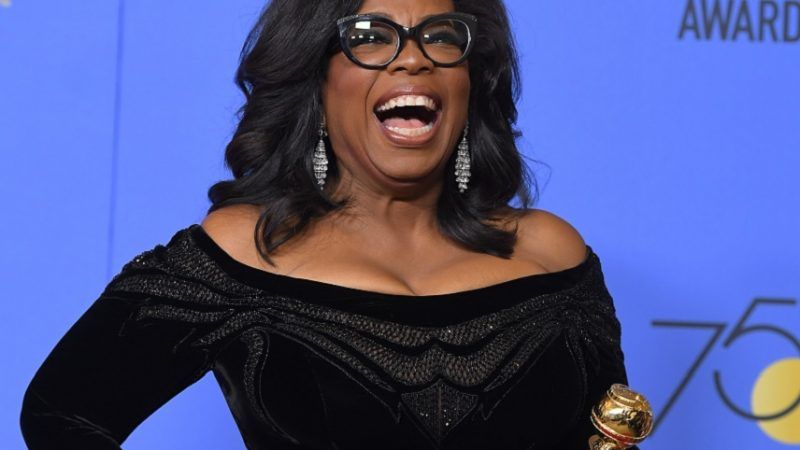Oprah's Golden Globes' Speech Deflects Attention From Hollywood

Welp. pic.twitter.com/usJMwKyDc9
— Josh Hammer (@josh_hammer) January 8, 2018
I admire what Oprah Winfrey has accomplished as a talk-show host, publisher, entrepreneur, and actress. Her defunct book club helped catapult some great writing to mass success it wouldn't have had otherwise. But her much-praised speech last night at the Golden Globes doesn't deserve the acclaim it's getting, including cries for her to run for president in 2020.
Not because it wasn't moving but because it so obviously and pointedly deflects attention away from Hollywood's leading role in the current #metoo moment. Think about it for a second: Here is Oprah receiving a richly deserved Cecil B. DeMille Award for Lifetime Achievement from the Hollywood Foreign Press Assocation just months after revelations about movie mogul Harvey Weinstein broke the dam on all sorts of despicable behavior that characterizes the entertainment industry. Yet she immediately shifts the focus from that awards room to virtually everywhere else:
It's not just a story affecting the entertainment industry. It's one that transcends any culture, geography, race, religion, politics, or workplace. So I want tonight to express gratitude to all the women who have endured years of abuse and assault because they, like my mother, had children to feed and bills to pay and dreams to pursue. They're the women whose names we'll never know. They are domestic workers and farm workers. They are working in factories and they work in restaurants and they're in academia, engineering, medicine, and science. They're part of the world of tech and politics and business. They're our athletes in the Olympics and they're our soldiers in the military.
And there's someone else, Recy Taylor, a name I know and I think you should know, too. In 1944, Recy Taylor was a young wife and mother walking home from a church service she'd attended in Abbeville, Alabama, when she was abducted by six armed white men, raped, and left blindfolded by the side of the road coming home from church. They threatened to kill her if she ever told anyone, but her story was reported to the NAACP where a young worker by the name of Rosa Parks became the lead investigator on her case and together they sought justice. But justice wasn't an option in the era of Jim Crow. The men who tried to destroy her were never persecuted. Recy Taylor died ten days ago, just shy of her 98th birthday. She lived as we all have lived, too many years in a culture broken by brutally powerful men. For too long, women have not been heard or believed if they dare speak the truth to the power of those men. But their time is up. Their time is up.
The story of Recy Taylor is horrific in the extreme and speaks to historical sexual and racial crimes for which America may never fully atone. But given Winfrey's own long association not just with Weinstein but Hollywood, it would have made more sense for her to at least call him and his enablers out by name. Her comments bring to mind the Dave Chappelle standup specials released on Netflix this New Year's Eve. One of them, "The Bird Revelation," was filmed in Los Angeles in late 2017 and focuses directly on the actions of Weinstein, comedian Louis C.K., and others accused of harassment and assault. Chappelle's refusal to moderate his language or turn away from any subject matter, no matter how controversial or offensive, is not for everyone, but he also does not flinch from implicating the entertainment industry and all who benefit from it in his act.
Even a critical reviewer at New York magazine acknowledges the power of such a move:
Chappelle is also astute when using literary or historical analogies to pick apart flaws in other people's thinking and reveal society's inner workings. A section on #MeToo that calls for a sexual equivalent of South Africa's Truth and Reconciliation Commission ("the system itself must be tried") is powerful and much-needed, as is his speculation on why fewer famous black men have been accused of misconduct than famous white men (he tracks it all the way back to Jim Crow and slavery: "[Black women] are scared to see us punished"). Ditto his closing routine in The Bird Revelation, which uses Iceberg Slim's Pimp as a foundational document for understanding capitalism, linking Slim's phrase "mileage on a ho" (how many sexual encounters a prostitute can endure before having a nervous breakdown) to the standard nine-to-five workday in America ("nine to six might kill a bitch"). Chappelle is at his best here, speaking quietly to the room like a disreputable but beloved professor who always brings the deep knowledge. He even waves a paperback book for emphasis.
Like I said, I admire Oprah Winfrey. She overcame immense difficulties and traumas that most of us will never have to deal with. She perfected a particular sort of talk-show format and, despite launching or helping the careers of cranks such as Dr. Oz and anti-vaccine activist Jenny McCarthy, promoted conversations that wouldn't otherwise have taken place. That's all to the good. But her speech at the Golden Globes smacked more of the sort of Hollywood smugness that South Park parodied during its 10th season than the sort of insight that should launch a political career.


Show Comments (25)